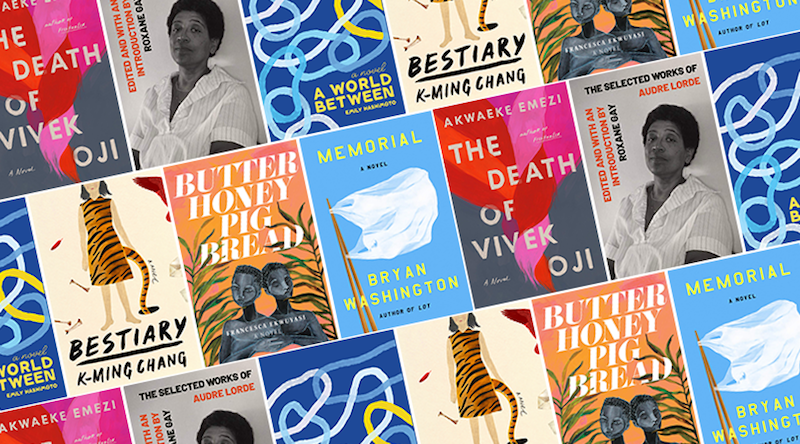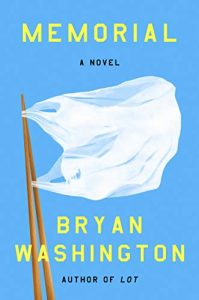
It’s that time of year again! Pride, and also the halfway point of 2020, a year that has been even more chaotic and devastating than even the most pessimistic among us could have imagined in January. For those of us who are still here, we fight on, and part of fighting on is making and engaging with art. As Pride month encourages us to reflect on the history, present, and future of revolution and liberation, it is also a good time to look ahead at the queer and trans voices who are bringing their stories into the world in the coming months. Here are some Own Voices LGBTQIA+ books to look forward to.
Lot Six by David Adjmi
(Harper, 6/23)
In this debut memoir, renowned playwright Adjmi charts a large swath of his life growing up in a conservative Syrian Jewish community in New York, his college and graduate school years, and his early career as a playwright. As he cerebrally navigates his often-dysfunctional relationships with his parents, friends, and even his therapists, Adjmi weaves a tight but sprawling tapestry of immersive prose exploring what it means to shape and reshape oneself in the distorted mirror of America.
The Death of Vivek Oji by Akwaeke Emezi
(Riverhead, 8/4)
Akwaeke Emezi is hands down one of the most exciting writers working today, that’s just an objective fact. Their previous books — 2018’s award-winning Freshwater and 2019’s YA hit Pet— have already won them well-deserved accolades. Vivek is yet another triumph, following the coming-of-age of a sensitive and mysterious boy in southeastern Nigeria. Utterly readable and impeccably crafted, this is a story about friendship, family, disorientation in the body, and community.
Tomboyland by Melissa Faliveno
(Topple, 8/4)
Faliveno is a prolific essayist whose work has appeared all over prestigious publications and was anthologized in 2015’s Derby Life (her roller derby name was Harlot Bronte. I mean.). She’s also a teacher, editor, and Midwesterner, and explores this last identity in depth in this debut collection. Delving into her upbringing in a working-class Wisconsin family and eventual move to New York, Faliveno writes about her relationship to place and land, and the tensions and intersections of class, queerness, gender, American culture, and identity.
Burning Sugar by Cicely Belle Blain
(VS Books, September)
Blain is the latest debut writer to be published by Vivek Shraya’s (who appears later on this list) imprint under Arsenal Pulp, VS Books, which each year offers publication and mentorship to a BIPOC writer in Canada. As the founder of Black Lives Matter Vancouver and a CEO of their own social justice-oriented consulting company, Blain is already a powerful presence in BC. Their dedication to liberation from white supremacist colonialism shines through in their electric, lyrical poetry. Don’t miss this one.
The Selected Works of Audre Lorde, edited and introduction by Roxane Gay
(Norton, 9/8)
Do you even need to know more? Audre Lorde continues to be a pillar of Black, queer, radical theory and art, and Roxane Gay is Roxane Gay. Both are two of the best writers ever to be too good for this earth, and their literary pairing is the most welcome thing to happen since… who knows what, but it doesn’t matter, just read all the Lorde and Gay that you can.
Bestiary by K-Ming Chang
(OneWorld, 9/8)
In this sensuous, twisty, gorgeous debut novel, three generations of Taiwanese America women navigate story, body, violence, queerness, and secrets. Bodies transform, moving through space and time. Family is knitted together and torn apart. The story is woven in the divine, precise, and melodic prose of a poet, which Chang is, and will burrow into you like an animal.
A World Between by Emily Hashimoto
(Feminist Press, 9/15)
Another stunning debut, this novel starts with the college romance of two young women, Eleanor and Leena, in 2004. Years later, when they run into each other on the street in San Francisco, they find themselves drawn together again, despite the separate lives they’ve built apart from each other, which don’t always mesh. This is a queer great character-driven story that complicates the notion of romance and explores what it means to be messy and carry histories.
like a boy but not a boy: Navigating Life, Mental Health, and Parenting Outside the Gender Binary by andrea bennett
(Arsenal Pulp, October)
The parenting genre is woefully lacking in gender-diverse narratives. Like a Boy is a welcome addition not only to parenting stories, but to memoir in general. bennett’s essays explore the body in depth, mapping both the difficult and humorous ways in which a body is inhabited. Creativity, caring, illness, work, and expression are all part of the body, and bennett’s beautiful prose will draw you into thinking about it in perhaps unexpected ways.
Kimiko Does Cancer by Kimiko Tobimatsu, illustrated by Keet Geniza
(Arsenal Pulp, October)
This graphic memoir charts the journey of a 25-year-old queer, mixed-race, healthy woman who is diagnosed with breast cancer. Tobimatsu’s prose is honest and clear, perfectly matched by Geniza’s elegant illustrations. The book (blessedly) critiques the pink-ribbon-drenched mainstream cancer narrative while simultaneously telling her own story of connecting to community and navigating life in treatment and recovery.
Our Work is Everywhere: An Illustrated History of Queer and Trans Resilience by Syan Rose with introduction by Leah Lakshmi Piepzna-Samarasinha
(Arsenal Pulp, October)
Piepzna-Samarasinha is a pillar in the queer and disability activist space, and the author and editor of many books spanning genre from memoir to nonfiction to poetry. Her foreword is the perfect opening to this powerhouse book of graphic nonfiction from illustrator Rose, whose art here brings to life the voices and power of a wide array of queer and trans organizers, leaders, artists, and healers. Simply put, this book is fire, and it’s a welcome addition to the revolutionary QTPOC canon.

God Loves Hair (10th Anniversary) Ed. by Vivek Shraya, illustrated by Juliana Neufeld, foreword by Cherie Dimaline
(Arsenal Pulp, October)
Shraya is one of the world’s most exciting multidisciplinary artists, whose work spans literature, theater, and music. She’s also incredibly prolific; her latest novel, The Subtweet, was on the list of most anticipated LGBTQ+ books for the first half of the year. God Loves Hair was her debut novel, a YA story collection that was self-published 10 years ago, and is now getting a special new edition complete with hardcover, and new preface, story, and illustrations. The book celebrates gender and artistic expression, religion, Brownness, creativity, and belonging. Plus, Cherie Dimaline is involved, what more do you need.

Memorial by Bryan Washington
(Riverhead, 10/6)
Last year, Washington’s debut story collection, Lot, was one of the best books of the year (according to me and a lot of other people). This fall will see the release of Washington’s first novel, a story about an interracial couple, Mike and Benson, in Texas who have grown perhaps too comfortable in their relationship. When Mike’s mother Mitsuko arrives for a visit, he finds out that his estranged father is dying in Japan, and immediately flies there. While Mike undergoes his own family reckoning, Mitsuko and Benson become de facto roommates, and form a meaningful relationship of their own. This book is so poignant and beautiful, asking questions about what it means to live a life and what it means to love.
Plain Bad Heroines by emily m. danforth, illustrations by Sarah Lautman
(William Morrow, 10/20)
danforth made a name for herself with what has now become a queer classic, 2012’s The Miseducation of Cameron Post (which was made into a successful film in 2018). This fall, danforth is back with her first book of adult fiction. Plain Bad Heroines is a horror-comedy that starts in 1902 and jumps to present day. The center of both stories (well, there are really three stories here) is the Brookhants School for Girls, which attracts both queer women and a lot of mystery… and death. This book is funny, haunting, and overall an engrossing story, complete with beautiful black and white illustrations.
Butter Honey Pig Bread by Francesca Ekwuyasi
(Arsenal Pulp, October in Canada, November in U.S.)
Ekwuyasi is a writer and filmmaker originally from Lagos, Nigeria whose films have been screened at several festivals in Canada, including the Halifax, Montreal, and Toronto Black Film Festivals. Butter Honey is Ekwuyasi’s debut novel, and embodies many of the themes found in her previous work: the intersections and tensions between queerness and faith, family, forgiveness, and belonging. It’s an intergenerational narrative about three Nigerian women, a mother and her twin daughters. The fissures that tear them apart must also, ultimately, bring them back together.
The Thirty Names of Night by Zeyn Joukhadar
(Atria, 11/3)
Joukhadar’s debut novel, A Map of Salt and Stars, got widespread (and well-deserved) critical acclaim when it was released in 2018. In his sophomore novel, Joukhadar continues to work in exciting ways with dual timelines and interwoven stories. At the center is a young, Syrian American, closeted trans boy in Manhattan, whose mother dies in a fire. He finds freedom and relief in painting murals late at night, and one day finds the journal of another Syrian American artist named Laila Z, who disappeared 60 years before. In true Joukhadar fashion, this novel sweeps the reader into a sensual, sweeping narrative filled with compelling characters.
Inheritance by Taylor Johnson
(Alice James Books, 11/10)
Johnson is a Washington, D.C.-based poet whose work is some of the most exciting out there. This is their debut collection, taking as its base everyday moments and observations in Johnson’s home city, and expanding outward to question and explore identity, desire, surveillance, and categories. It employs all the senses and dances with language; this is a poet to watch.
The Freezer Door by Mattilda Bernstein Sycamore
(Semiotext(e), 11/24)
Sycamore is the author of three novels and a memoir, and the editor of five nonfiction anthologies. Her last book, 2018’s Sketchstasy, was widely acclaimed and could safely be called a modern queer classic. It’s very rooted in Seattle, Sycamore’s home city and a petri dish of economic inequality, but a place also full of community and love. The Freezer Door is a story about queerness, belonging, loneliness, desire, and the utter havoc of capitalism.


